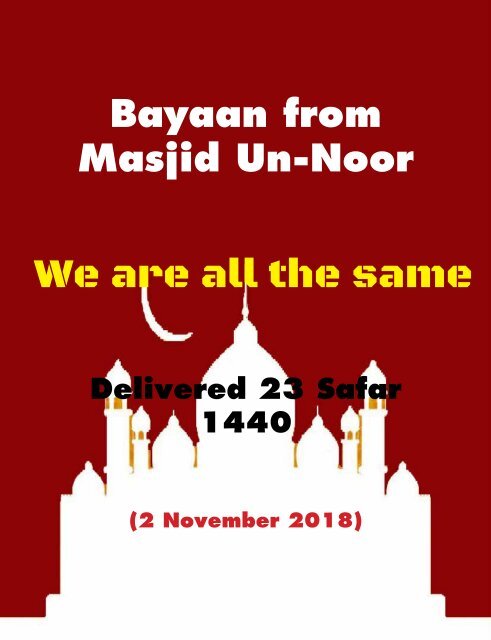Create successful ePaper yourself
Turn your PDF publications into a flip-book with our unique Google optimized e-Paper software.
<strong>Bayaan</strong> <strong>from</strong><br />
<strong>Masjid</strong> <strong>Un</strong>-<strong>Noor</strong><br />
<strong>We</strong> <strong>are</strong> <strong>all</strong> <strong>the</strong> <strong>same</strong><br />
Delivered 23 Safar<br />
1440<br />
(2 <strong>November</strong> <strong>2018</strong>)
That is why we a<br />
<strong>We</strong> <strong>are</strong> <strong>all</strong><br />
Bismillahir Rahmanir Rahim. Respected friends and elders. Asaalamu Alaikum. Thanks to<br />
Allah I stand here today to deliver a <strong>Bayaan</strong>. This is <strong>all</strong> inspired by Allah, <strong>the</strong> most merciful<br />
without whom we cannot do anything. All for <strong>the</strong> pleasure of Allah as it is expressed in <strong>the</strong><br />
Holy Quran.<br />
This is a little <strong>Bayaan</strong> inspired by an article I picked on <strong>the</strong> Yaqeen (institute for Islamic Research)<br />
website. It is written by Zohair Abdul-Rahman and Nazir Khan.<br />
I have of course also enhanced it with a few of my own observations, but it is such a profound<br />
article.<br />
Let us just start with a few things. It is true we <strong>are</strong> <strong>all</strong> humans. In <strong>the</strong> greater scheme of<br />
things, we <strong>are</strong> <strong>all</strong> <strong>the</strong> <strong>same</strong>. If we could an alien just arrived here “what <strong>are</strong> <strong>the</strong> differences<br />
of humans?” <strong>the</strong> alien would probably say that we <strong>all</strong> look <strong>the</strong> <strong>same</strong>, react <strong>the</strong> <strong>same</strong>, talk <strong>the</strong><br />
<strong>same</strong>, act <strong>the</strong> <strong>same</strong> – probably running away, but that is something else.<br />
And it is probably correct. <strong>We</strong> <strong>are</strong> by and large <strong>the</strong> <strong>same</strong>.<br />
However, <strong>the</strong>re <strong>are</strong> of course differences. These can re<strong>all</strong>y only be seen when we get closer to<br />
<strong>the</strong> actual unique individual.<br />
It is <strong>all</strong> about personality. The article is claiming that too often we see Muslims not being<br />
comfortable in <strong>the</strong> <strong>Masjid</strong> or in Islamic ga<strong>the</strong>ring. Dress code, beard, norm, traditions, <strong>the</strong><br />
correct way and <strong>all</strong> kind of man-made rules may just invade a young mind. Or an old mind<br />
for that matter.<br />
Islam embraces diversity. Islam has <strong>the</strong> breadth necessary for <strong>all</strong> to thrive and to use <strong>the</strong><br />
talents Allah has given us. Remember, we should <strong>all</strong> grow in faith and feel a part of this mission.<br />
So, where do we <strong>the</strong>n differ.<br />
Personality! And <strong>the</strong>n it also walks into skills.<br />
The article states that our Prophet Muhammed (SAW) had an ability to choose people according<br />
to <strong>the</strong>ir personality best suited for a task.<br />
I can mention one – indeed one of my heroes: Bilal. Going <strong>from</strong> slave to minister of finance is<br />
not a bad c<strong>are</strong>er jump.<br />
Here is a Hadith to this extent:
<strong>the</strong> <strong>same</strong> -<br />
re so different<br />
“Indeed Allah Most High created Adam <strong>from</strong> a handful that He took <strong>from</strong> <strong>all</strong> <strong>the</strong> earth. So<br />
<strong>the</strong> children of Adam came in according with <strong>the</strong> earth, some of <strong>the</strong>m came red, and black<br />
and white, and between that, and <strong>the</strong> lenient, <strong>the</strong> hard-headed, <strong>the</strong> filthy and <strong>the</strong> pure”<br />
(Jani’ al-Tirmidhi, 3212)<br />
Somehow, this Hadith talks about <strong>the</strong> three defining things in humans: physical appearance,<br />
personality and character. <strong>We</strong> could also c<strong>all</strong> it body, mind and spirit.<br />
But let us also look at <strong>the</strong> exact words of Allah:<br />
Surah 17:84<br />
Everyone acts in his own way, and your Lord knows best who is rightly guided<br />
It could also be: Everyone behaves according to <strong>the</strong>ir nature (Shakil)..<br />
Personality is re<strong>all</strong>y something static. It is <strong>the</strong> way we <strong>are</strong> born, somehow. Personality is also<br />
value-neutral.<br />
It is where we walk into character, that we see value systems coming to <strong>the</strong> fore. Character<br />
can be changed. Character can be lumbered with anger, humility, generosity, sincerity, patience,<br />
and so on.<br />
Now we see why this here is important.<br />
What is it we must work on as Muslims: Character. That is what Allah has commanded you.<br />
But Allah has also given you a choice. You can choose to do <strong>the</strong> easy thing or <strong>the</strong> right thing.<br />
It is also said: Give Allah what is right, not what is left”. Our Prophet (SAW) said: “I was sent<br />
to perfect good character”<br />
(Muwatta Malik).<br />
Here is a direct quote:<br />
“In a fascinating passage, Ibn Taymiyyah (d. 728 AH) answers <strong>the</strong> question of whe<strong>the</strong>r one<br />
should focus on streng<strong>the</strong>ning one’s faith (imān ) by first starting with abstinence (zuhd),<br />
knowledge (‘ilm), or acts of worship (ibādah ). He replies:<br />
“People differ in this regard. From amongst people, some find knowledge easier than zuhd,<br />
some find zuhd easier than ‘ilm, and some find ibādah easier than both of <strong>the</strong>m. What is<br />
prescribed (mashroo’) is that everyone acts according to what <strong>the</strong>y <strong>are</strong> capable of goodness<br />
based on <strong>the</strong> verse “Have taqwa of Allah as much as you <strong>are</strong> able” (64:16). So when <strong>the</strong><br />
branches of faith become crowded, a person proceeds with what is most pleasing to God by<br />
acting according to what he is most capable”.<br />
Ibn Taymiyyah. Majmoo’ al-Fatawa, vol. 6, pp. 651-652.
<strong>We</strong> <strong>are</strong> <strong>all</strong><br />
Ibn Taymiyyah goes on to explain that what becomes <strong>the</strong> most virtuous action<br />
for a person is whatever comes more readily to him and provides <strong>the</strong><br />
greatest benefit to his faith, even if that action might not be intrinsic<strong>all</strong>y better<br />
than o<strong>the</strong>r actions.<br />
For instance, a person who finds voluntary prayers at night onerous might<br />
benefit far more <strong>from</strong> engaging in more recitation and contemplation of <strong>the</strong><br />
Qur’an, or more dhikr (remembrance), and <strong>the</strong>se actions may be considered<br />
more virtuous for this individual.<br />
As a corollary, no one can belittle <strong>the</strong> good deeds of o<strong>the</strong>rs, since only Allah<br />
knows which of <strong>the</strong>m <strong>are</strong> most valuable and most virtuous for which person.<br />
What is re<strong>all</strong>y said is that Allah has created us with different personalities.<br />
What is easy for one person is not so easy for ano<strong>the</strong>r person. And that is also<br />
fine.<br />
Now comes <strong>the</strong> learning part:<br />
<strong>We</strong> should also as true Muslims show respect for o<strong>the</strong>r people. Which way of<br />
worship is ‘<strong>the</strong> best’? well, we don’t know, do we?<br />
<strong>We</strong> should <strong>the</strong>refore never look down on one person for doing something<br />
(within <strong>the</strong> over<strong>all</strong> faith concept of course) which is according to this person’s<br />
personality and character.<br />
Surah 16: 116<br />
Do not falsely decl<strong>are</strong>, ‘This is lawful, and this is forbidden’, so as to invent a<br />
lie against Allah.<br />
What we have here is re<strong>all</strong>y a warning to respect <strong>all</strong>. To not cast ourselves as<br />
<strong>the</strong> judge of <strong>all</strong> and sundry. Who am I to say what <strong>the</strong> will of Allah is? This will<br />
border on arrogance, and that is not surely not pleasing to anybody.<br />
If we now return to <strong>the</strong> first part of this <strong>Bayaan</strong>, it is also about making space<br />
for diversity. Insofar as we <strong>are</strong> <strong>all</strong> <strong>the</strong> <strong>same</strong> and very different, Islam can and<br />
will accommodate us <strong>all</strong>.
<strong>the</strong> <strong>same</strong><br />
Why was Islam so successful in <strong>the</strong> first few hundred years? Because it respected<br />
diversity! It was re<strong>all</strong>y a matter of welcoming everybody, with <strong>the</strong>ir<br />
faults (and who is faultless?), <strong>the</strong>ir personalities, <strong>the</strong>ir characters, <strong>the</strong>ir way of<br />
worshipping, cultural differences.<br />
The over<strong>all</strong> Islamic word is re<strong>all</strong>y UNITY. <strong>We</strong> <strong>are</strong> united in this. <strong>We</strong> have <strong>the</strong><br />
<strong>same</strong> basic understanding of Islam and what it is to be a Muslim.<br />
… and that is for <strong>the</strong> pleasure of Allah<br />
I am grateful to <strong>the</strong> Almighty for having granted me this new opportunity<br />
to address you today and I thank you for having given me <strong>the</strong> time to talk to<br />
you. First give me hidayah and to <strong>all</strong> mankind success, only on <strong>the</strong> command<br />
of Allah and <strong>the</strong> lifestyle of <strong>the</strong> Prophet Mohammed, S<strong>all</strong>aalahu Aleihi wasalaam.<br />
Ameen.<br />
Asaalamu alaikum<br />
Ilyaas Otterstrom<br />
076 503 1282

















